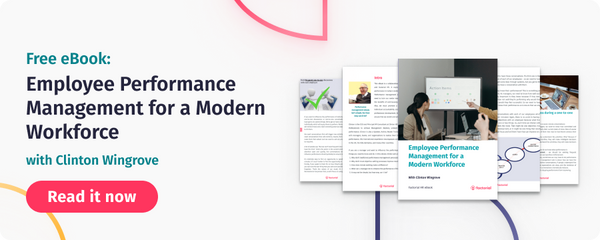Getting the best out of your people is perhaps one of the most important factors for any successful business. Why? Because employees are your greatest asset. Each staff member brings different skills and experience, overcoming difficulties and barriers in the workplace by sharing ideas. That said, people spend most of their waking time at work. Places where employees are consistently told what to do, have unfair pay, or have micromanagers can quickly become toxic work environments. This is why workplace democracy is so important.
This article will help you understand what workplace democracy is, how to maintain it and the benefits of doing so. This should help you to nurture an environment that offers challenging and meaningful work for your people.
- What is workplace democracy?
- What are the benefits of workplace democracy?
- What are the disadvantages of workplace democracy?
- Seven ways to turn your workplace into a democratic organisation
- How Factorial HR can help you promote democracy in the workplace
What is Workplace Democracy?
The word ‘democracy’ comes from Ancient Greece; it means “rule by people.” In democratic organisations, people have a say in decision-making, and how they impact themselves and the business they work for.
Workplace democracy gives team members a voice and an element of control within their organisation.
Democratic organisations are created by having a range of principles in place, such as tolerance, respect, and choice. These environments encourage people to contribute towards decisions that impact their working life, for example the introduction of a new policy or undertaking a training course.
Put simply, democracy in the workplace is about having a balance of power between business owners, leaders and managers, and the people who work there.
What are the Benefits of Workplace Democracy?
Building a democratic workplace creates a better work culture. In fact, creating a great work culture is identified as one of the top five trends in the latest Indeed & Glassdoor’s Hiring and Workplace Trends Report.
Working for an organisation that has authoritarian processes, such as applying sanctions to people who don’t meet targets, leaves people feeling devalued and unmotivated. Employees who feel unappreciated often end up voting with their feet and seeking alternative employment.
The best workplaces are those that care for their employees. They prioritise employee engagement and use this as the springboard for achieving business targets.
Democratic workplaces have many benefits, including:
- Boosted staff morale. They encourage workers to make their own independent decisions, for example, prioritising their own workload or working hours.
- Attract top talent. Democratic companies are a magnet for top talent. People want to work for businesses that offer more flexible working options or are willing to negotiate salary expectations.
- Improved employee retention rates. According to a 2022 report, 39% of HR colleagues said their organisation has seeing an increase in staff resignations. Democratic workplaces have systems in place to motivate people to share their ideas and feel valued.
- Improved employee engagement levels. Workplaces are seeing a decrease in employee engagement levels in comparison to pre-pandemic levels. They create a democracy by recognising and rewarding top performers, for example, celebrating achievements with recognition and awards.
- Better communication. Democratic companies help people feel understood and heard. Individuals who feel comfortable communicating their needs to their managers are more connected to their work and understand what’s expected of them.
- People who feel valued. Businesses show staff they are valued by keeping them updated about the difference they’re making to their organisation. For example, consistently sharing information about how individuals have contributed to achieving sales targets reinforces feelings of appreciation.
- Demonstrate organisational values. Implementing workplace democracy and inclusive leadership highlights the organisational values of your company. Democratic companies stay positive when overcoming challenges and show integrity by being responsible for their own actions.
- A safe and supportive environment. Employees feel confident to try out new ways of working without fear of reprisal. Democratic workplaces foster a culture of transparency and trust with everyone.
- Build excitement for the future. Democratic workplaces are committed to giving their people career opportunities.
All in all, a workforce democracy encourages creativity and innovation with shared ownership.
What are the Disadvantages of Workplace Democracy?
Nurturing a democratic workplace has huge benefits for everyone; the people who work there, managers, business owners, and other key stakeholders.
Having said that, democracy in the workplace takes time and effort. Maintaining behaviours like trust, honesty, and collaboration consistently lead to better business outcomes, but doing so takes a considerable amount of concentrated effort.
Secondly, it costs. It can be expensive trying to get all team members on board–especially when they don’t agree on a particular issue. Allocating additional time for meetings with groups of staff or individuals could take its toll on your workload.
Finally, reaching an agreement where everyone is happy can be difficult. Different personalities, backgrounds and conflicting priorities can lead to frustration. Deciding on new technology or disagreements over tasks, for example, can result in tensions. However, democratic workplaces have proactive measures in place that encourage employee differences and support them to work out the best way forward together.
7 Ways to Turn Your Workplace into a Democratic Organisation
The benefits of workplace democracy are clear to see. Let’s take a deeper dive at seven ways you can turn your company into a democratic workplace.
1. Offer consistent job enrichment experiences
Job enrichment is a strategy that motivates employees to increase their job satisfaction. The approach gives team members meaningful tasks, allowing them to understand the reason why tasks are done and business decisions are made.
Give your people more control over their roles. Offer job rotation opportunities that give staff experience of working in other departments, increasing skills and knowledge.
Encourage succession planning with access to training and development opportunities.
Prioritise individual progression with career paths that people feel excited about. That said, only one in four employees are confident about their career with their current employer. Give people the confidence to make decisions about applying for higher-level roles within your company.
Democratic workplaces champion two-way communication. They ensure employees are consulted about decisions that affect their personal development and don’t make assumptions about what they think people want!
Job enrichment improves the employee experience, increasing workplace motivation and overall job satisfaction.

2. Eliminate hierarchy
Although hierarchical organisations come with clearly defined communication structures, they also comes with disadvantages.
Let’s take a look at organisational charts. The purpose is to show the structure of a business, defining roles, responsibilities and relationships between staff members. However, the configuration of organisational charts is built on levels of hierarchy–from the CEO at the top down to people generally on lower pay scales.
Eliminate hierarchy and review how you share information about your organisation with existing employees and new hires by:
- Changing visual displays that show ‘who is who’ in your organisation. Rather than having a top-down list with leaders and managers at the top and staff members underneath, display your organisational structure in a circular format instead.
- Giving junior team members additional responsibilities. Make sure they feel just as appreciated as more senior members of your organisation with tasks that challenge their thinking.
- Reviewing meeting structures. Eliminate hierarchy in team meetings by changing the seating arrangements or making sure everyone is given the opportunity to speak.
- Letting everyone know you value their opinion. Micromanagement hinders creativity and productivity. Give people the confidence to speak up by asking for their opinions.
3. Encourage enterprise
Freedom, autonomy, and enterprise are critical for workplace democracy. Businesses that encourage enterprise allow employees to identify opportunities and use them to their advantage.
Plus, enterprising staff members need teamwork skills to collaborate with others in their organisation. Encourage employees to build great relationships with each other by normalising discussions about interests outside of work.
According to Gartner’s report on top HR priorities for 2023, 82% of employees say it’s important for their organisation to see them as a person, not just as an employee. Reassure people that expressing their authentic selves with colleagues is normal practice. Employees will start to see themselves as more than how their job titles define them–inspiring them to share new ways for improving your business.
4. Give people a voice
Giving staff members a voice was identified as one of the top five key takeaways from the first workplace democracy citizens’ assembly.
Make people feel heard. Encourage employees to feel confident about sharing their own ideas and opinions with worker councils, employee debates or voting systems.
Next time you arrange a team-building activity, consult with employees and ask for their feedback. Never assume you have made the right decisions by seeking out genuine, honest views from team members. You may find out your team-building ideas don’t actually suit everyone. What may be ideal for a 25-year-old may not be great for an older member of your team nearing retirement.
5. Treat everyone fairly
Sounds obvious, right? But you’d be surprised at how many organisations treat their staff differently.
A survey of over 2000 UK workers found that 26% of people had previously been discriminated against on the grounds of their gender at work. It’s why diversity and inclusion initiatives remain a key trend for 2023.
Democratic workplaces place a high emphasis on treating all staff fairly and without bias.
Personalise employee support for those experiencing financial difficulties. Almost 8 in 10 employees said they expect their organisation to support them through financial hardship. Perhaps you could offer remote or hybrid working arrangements that help people to reduce their commuting costs.
Provide coaching opportunities or flexible working practices for everyone, regardless of age, gender, religion, or sexuality. Our performance management solution gives you real-time data about all team members’ personal development, allowing you to put any actions in place to tackle any discriminatory practices.
Perhaps one of the simplest ways to find out how your workforce feels is to ask. Consult with people and find out whether team members feel fairly treated, formally through one-to-one meetings, or informally through ad-hoc discussions over lunch.
6. Tackle any pay inequalities
Did you know that white people in England and Wales had an average hourly income that was 2.3% bigger than that of ethnic minority groups?
Workplace democracy not only tackles pay inequalities but also creates an environment where business leaders put proactive measures in place to prevent any future imbalance by:
- Offering high-quality recruitment training to eliminate the ways pay differences to get into the hiring process.
- Performing a pay equity audit with robust HR reports and metrics. Monitoring how people get the same opportunities to advance, regardless of gender, age, or religion.
- Being transparent about pay policies. Sharing openly the skills, qualifications and experience needed now and in the future with individuals.
Democratic workplaces keep pay equity on their radar. It should be an ongoing commitment and not an ad-hoc initiative.
7. Provide greater transparency about finances and decision-making processes
Your people are your key stakeholders. Democratic workplaces have employee representatives at all levels.
Better governance arrangements allow for greater transparency.
Have your people present at strategic meetings concerning budgets, recruitment, or new developments. Give employees the opportunity to understand, contribute and feedback information to your workforce. Create a workplace democracy with employee participation at every level.
How Factorial HR Can Help You Promote Democracy in the Workplace
There’s no doubt that a workplace democracy can propel your business forward and keep it competitive. Factorial HR can offer you a first-class HR solution that increases employee engagement, autonomy and freedom by:
- Recruiting new hires fairly, quickly, and efficiently. Improve your recruitment processes with an applicant tracking system. Make sure your pay structures are clear and fairly applied.
- Supporting staff development. Provide performance management reviews which employees and managers can base informed decisions upon.
- Sharing important events and information. Build a democratic workplace with excellent internal communications and events news. Provide transparency about new budgets or changes to management structures, and get more commitment from employees.
- Preparing employees for their new roles. Integrate new hires into their role quickly with top-notch onboarding processes. Personalise their experience and make them feel valued from the start with welcome videos or asking direct questions about their recruitment experience so far.
Create Your Workplace Democracy
It takes understanding, time, and effort to build a democratic workplace. Having said that, the rewards clearly outweigh these drawbacks.
Factorial HR can support you to build democracy across your organisation by streamlining some of the processes we’ve mentioned here. This will allow you to more spend time on other business priorities and to celebrate success with your workforce.
Ready to learn more? Find out how Factorial HR can support your organisation with our free 14-day trial.



